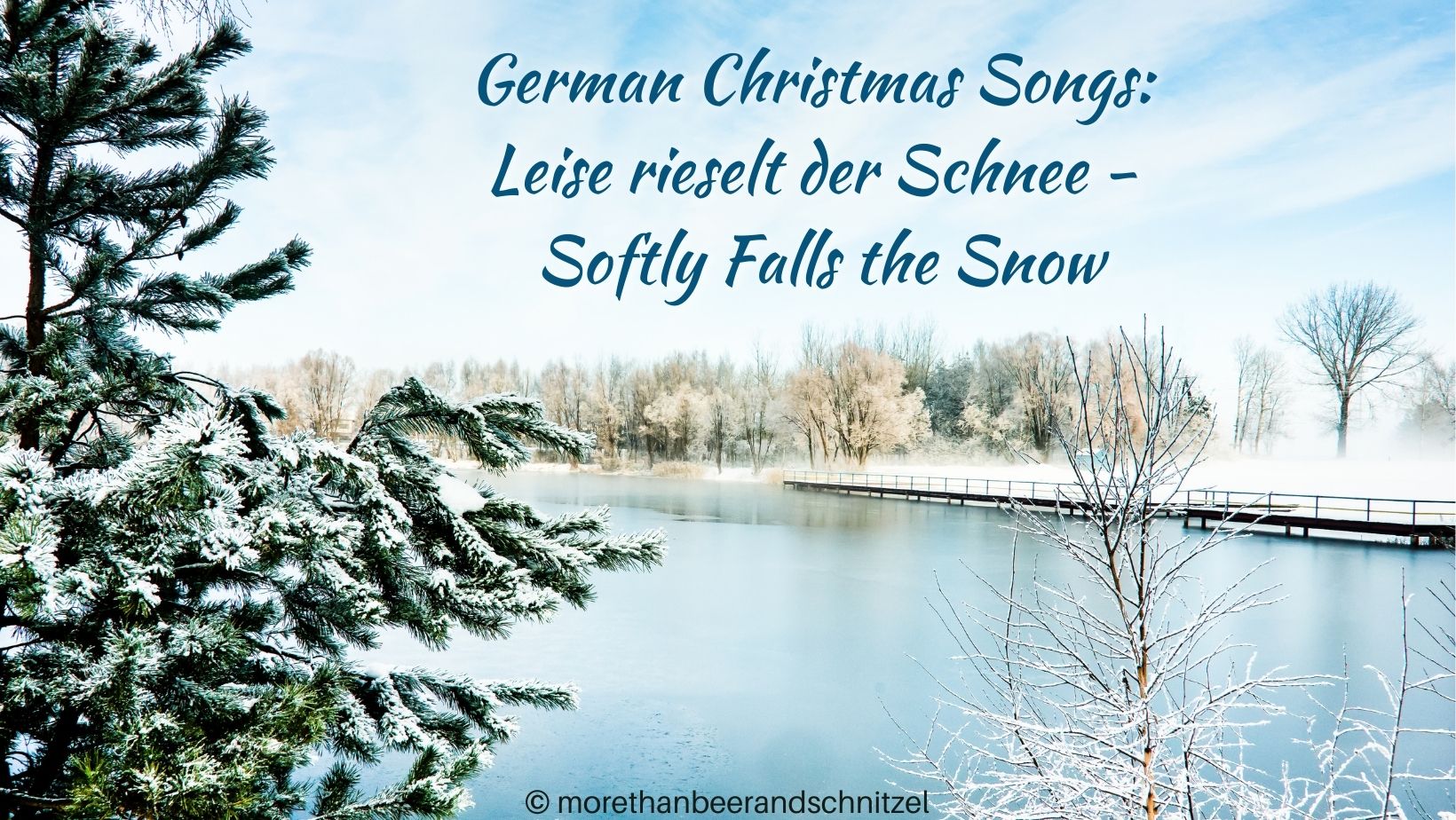The song Leise rieselt der Schnee (Softly falls the snow) was written by Eduard Ebel and published under the name Weihnachtsgruß in his poetry collection Gesammelte Gedichte in 1895. It is not clear whether the music was also written by Ebel, who was a protestant pastor, writer, and composer, or whether it is a folk tune.
Lyrics in German and English
Leise rieselt der Schnee,
Still und starr ruht* der See.
Weihnachtlich glänzet der Wald:
Freue Dich, Christkind kommt bald!
In den Herzen ist’s warm,
Still schweigt Kummer und Harm,
Sorge des Lebens verhallt:
Freue Dich, Christkind kommt bald!
Bald ist Heilige Nacht,
Chor der Engel erwacht,
Horch’ nur wie lieblich es schallt:
Freue Dich, Christkind kommt bald!
* in the original it says “liegt”
Snow falls soft in the night
Stars o’er the lake shine so bright,
The forest reflects holy night,
The Christ Child is coming tonight!
Hearts of mankind are warm,
Tonight all sorrow is gone,
From heaven there shines a great light,
The Christ Child is coming tonight!
Choirs of angels are singing,
Hear the church bells all ringing,
They tell of a glorious sight,
The Christ Child is born on this night!
Parodies
There are some parodies with new text, some harmless-funny, others more political.
School-related
The following stanza was popular with school-aged students during the 1980s. There are different versions, they deal with bad grades on the report cards and the violent reaction of the father. Many of the original phrases like “Leise rieselt”, “Freu dich”, and “Horcht nur” are taken from the original.
Leise rieselt die Vier
Auf das Zeugnispapier,
Fünfen und Sechsen dazu,
Freue dich, sitzen bleibst du.
Traurig gehst du nach Haus,
Alle lachen dich aus,
Horch nur, wie lieblich es schallt,
Wenn Papas Ohrfeige knallt.
Softly falls the Four (D)
onto the report card paper.
Add Fives (Es) and Sixes (Fs),
Rejoice, you will have to repeat the school year.
Sad you go home,
Everybody’s laughing at you.
Listen carefully, how lovely it sounds,
When daddy’s slap booms.
Listen to one version here.
Dieter Süverkrüp
Of a more serious nature is the 10 stanza poem by Dieter Süverkrüp from 1969. Süverkrüp was born in 1934 in Düsseldorf and is a song writer, cabaret artist, and graphic designer. Many of his songs are political, some more obvious than others. Often, his lyrics can only be fully understood in their historical context. Leise rieselt der Schnee is not the only Christmas song he used for his parodies, others are Morgen kommt der Weihnachtsmann and Stille Nacht, Heilige Nacht.
Süverkrüp’s poem is set against the Cold War and the 1968 invasion of Czechoslovakia by troops of Warsaw Pact states to suppress the democratic and reformatory efforts (Prague Spring), when the ‘cold’ war almost turned ‘hot’. He also draws the connection between war, warmongering, arms deals, and profits, referencing World War II, and fearing the next war.
The following is the last stanza. The verb schnieseln is a combination of Schnee (snow) and nieseln (to drizzle), however in the context of the verse it doesn’t seem to fit that the reactionary is quietly snow-drizzling his tea. It might just be a fun wordplay with rieseln (to flutter).
Leise schnieselt der Re-
aktionär seinen Tee.
Horcht nur, wie lieblich es knallt!
Fürchtet euch, Kriegskind kommt bald!
Quietly does the reactionary
drink? drizzle? his tea.
Listen carefully, how lovely it booms!
Be afraid, war child is coming soon!
Torfrock
The German folk music group Torfrock (peat rock) made a cover version that mixes different Christmas songs. It starts with:
Leise pieselt das Reh
gelbe Spuren in den Schnee
und die vielen kleinen Engels
und die vielen kleinen Engels
tun sich Rum in ihren Tee.
Softly tinkles the deer
yellow trails in the snow
and the many angels
and the many angels
put rum into their tea.
Watch the video here.



